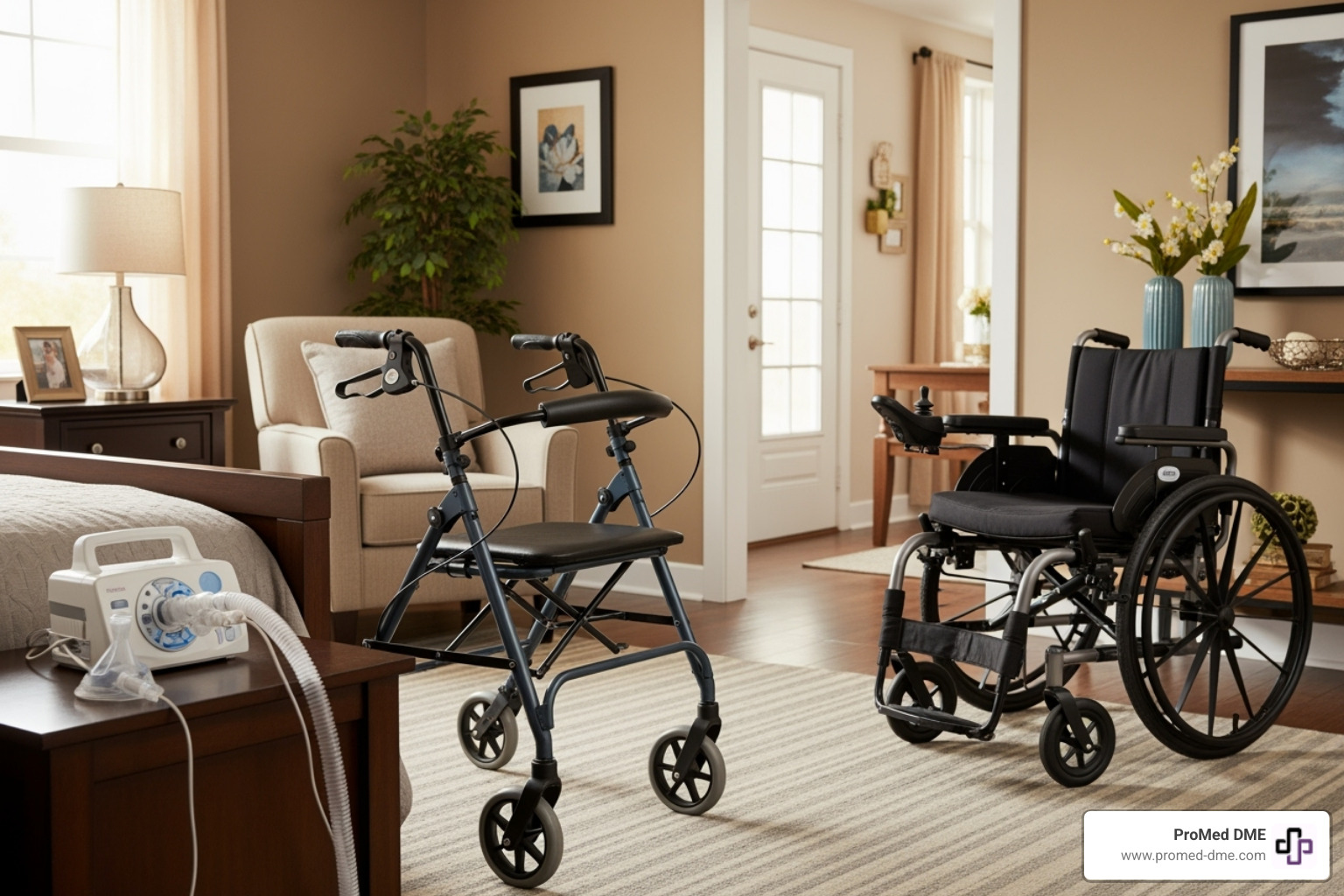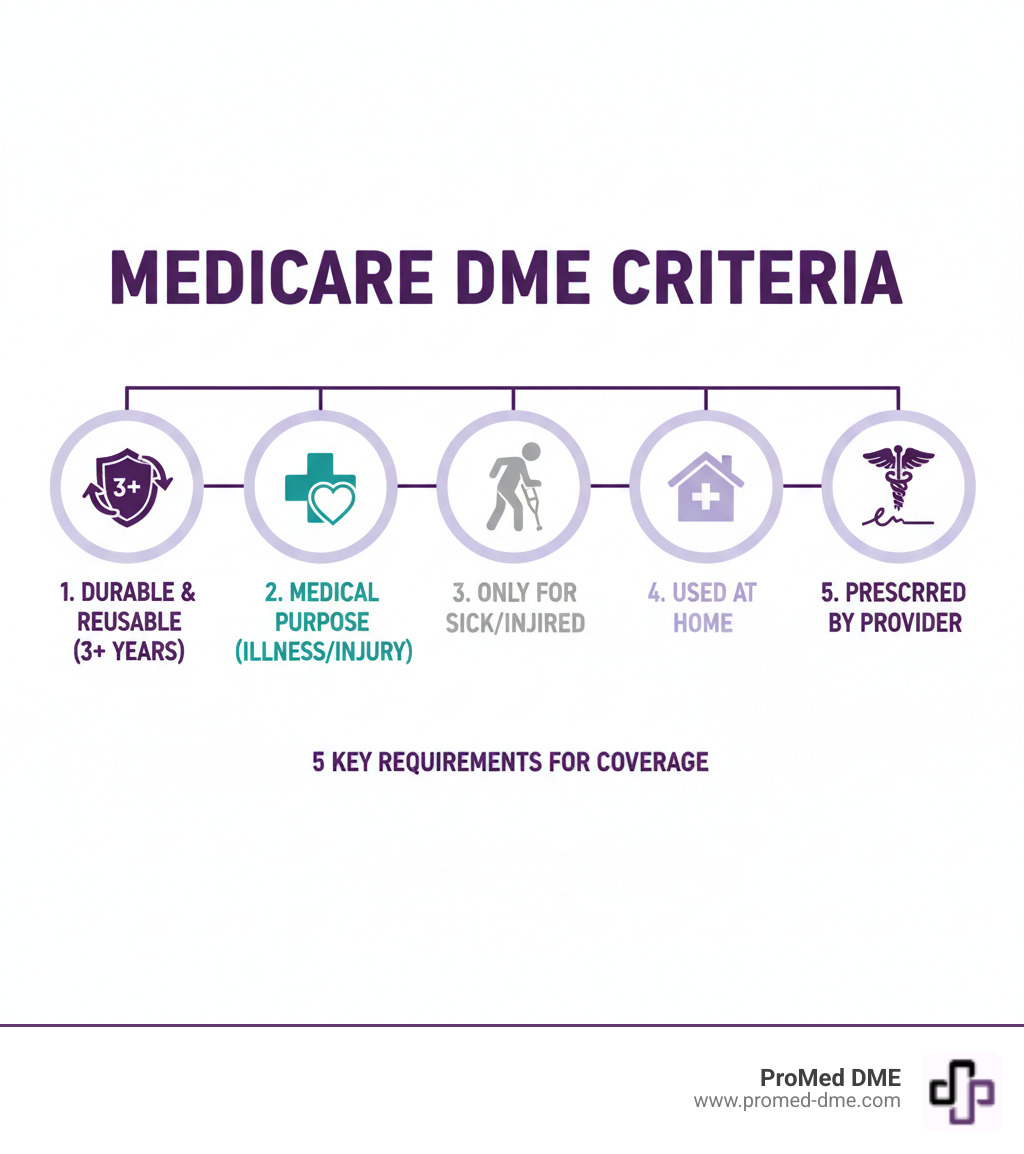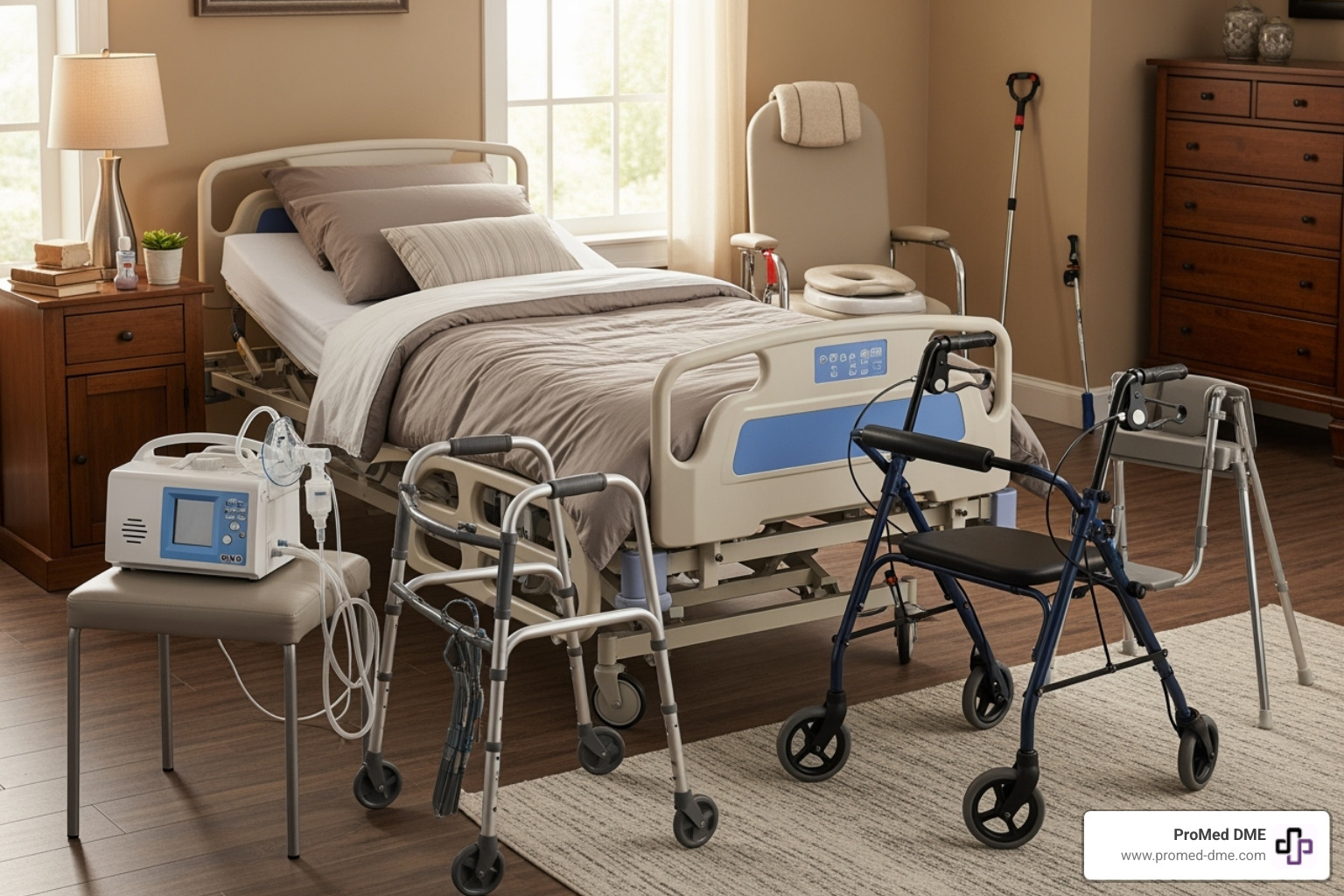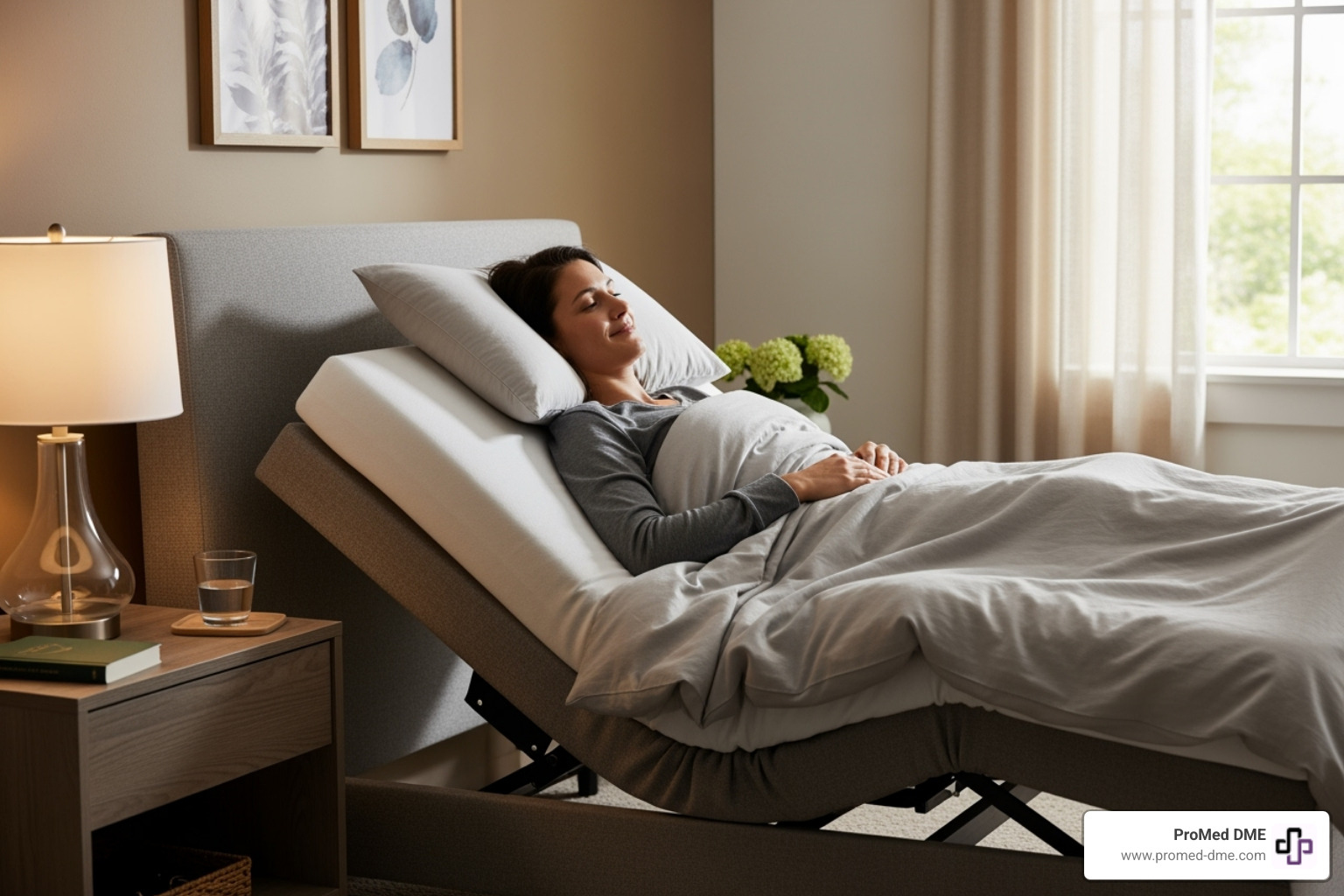Beyond the Equipment: Understanding Your DME Supply Options

Why Understanding DME Supplies Matters for Your Health and Budget
DME supplies are medical equipment items that help you manage health conditions at home while maintaining your independence. These supplies range from mobility aids like walkers and wheelchairs to respiratory equipment like oxygen concentrators and CPAP machines.
Key DME Supply Categories:
- Mobility Equipment - Wheelchairs, walkers, canes, crutches
- Bath Safety - Shower chairs, raised toilet seats, grab bars
- Respiratory - Oxygen concentrators, nebulizers, CPAP machines
- Patient Care - Hospital beds, patient lifts, commodes
- Monitoring - Blood pressure monitors, glucose meters
Medicare Coverage Basics:
- Covers medically necessary DME prescribed by your doctor
- You pay 20% after meeting Part B deductible
- Equipment must be used in your home
- Supplier must be Medicare-enrolled
According to Medicare guidelines, DME must meet five key criteria: it's durable, used for medical reasons, typically only useful to someone who is sick or injured, used in your home, and expected to last at least 3 years.
Finding the right DME supplies isn't just about getting equipment; it's about understanding your coverage, choosing quality suppliers, and ensuring you get the support you need. With millions of Americans relying on DME and Medicare Part B covering essential equipment prescribed by enrolled doctors, knowing your options can save you money and improve your quality of life.

What Qualifies as Durable Medical Equipment (DME)?
Understanding what qualifies as DME supplies is straightforward once you know the rules. Medicare defines Durable Medical Equipment using five key criteria:
- Durable: It must be reusable and expected to last at least three years. This includes items like hospital beds and wheelchairs, not disposable supplies.
- Medical Purpose: It must be prescribed by a doctor to treat a specific illness or injury.
- Primarily for the Sick or Injured: The item is generally not useful to someone who isn't sick or injured.
- For Home Use: It must be used in your home, which can include an apartment or assisted living facility.
- Prescribed by a Medicare Provider: A Medicare-enrolled doctor must order the equipment for your condition.
These rules help separate medically necessary equipment from convenience items. At ProMed DME, we help you steer these requirements to ensure you get the DME supplies that will truly make a difference in your daily life.

Common Categories of DME
DME supplies fall into several key categories designed to improve safety and independence at home:
- Mobility Aids: Walkers and rollators provide stability, while wheelchairs (manual and power) offer greater mobility. Crutches and canes provide temporary or long-term support.
- Bath Safety: Shower chairs and raised toilet seats with safety frames reduce the risk of falls in the bathroom.
- Respiratory Equipment: Oxygen concentrators deliver a steady supply of oxygen, nebulizers administer inhaled medications for conditions like asthma, and CPAP machines treat sleep apnea.
- Patient Room Equipment: Homecare beds offer adjustable positioning for comfort and care. Patient lifts ensure safe transfers, and overbed tables provide a convenient surface for meals and activities.
- Other Supplies: This includes items like commode chairs for accessible toileting and blood sugar monitors for diabetes management. Each item serves a specific medical purpose to help people live more independently.
Items Not Typically Considered DME
It's also important to know what isn't considered DME supplies. Generally, items that are disposable, for general comfort, or are home modifications do not qualify.
- Disposable Supplies: Items like incontinence pads, bandages, gloves, and syringes are considered medical supplies, not durable equipment.
- Comfort or Convenience Items: Equipment that isn't strictly medical, such as air conditioners or grab bars not prescribed as medically necessary, usually isn't covered as DME.
- Home Modifications: Structural changes to your home, like installing ramps or widening doorways, are classified as home improvements, not DME.
Understanding this distinction is key for managing insurance expectations, as coverage differs for these categories.
Navigating Insurance and Medicare Coverage for DME
Navigating insurance for DME supplies can seem complex, but understanding the basics makes it manageable.
Medicare Part B is the primary source of coverage for medically necessary DME. For coverage to apply, your Medicare-enrolled doctor must prescribe the equipment for use in your home, providing medical necessity documentation that clearly explains why it's essential for your health.
Regarding costs, after you meet your annual Part B deductible, you are typically responsible for a 20% coinsurance of the Medicare-approved amount, with Medicare covering the other 80%.
You may also have the option to rent or buy your equipment. Medicare's rules vary by item; some are rental-only, while others can be purchased. Your supplier should explain these options, as renting can be better for short-term needs and buying may be more cost-effective for long-term use.
Here's a helpful comparison of renting versus buying DME:
| Feature | Renting DME | Buying DME |
|---|---|---|
| Pros | Lower upfront cost | Equipment becomes yours |
| Maintenance often included | No ongoing rental payments | |
| Good for short-term needs | Good for long-term needs | |
| Flexibility to upgrade or change equipment | May be more cost-effective over long periods | |
| Cons | No ownership of the equipment | Higher upfront cost |
| Long-term rental can exceed purchase cost | Responsible for maintenance and repairs | |
| May have limited customization | Less flexibility if needs change | |
| Monthly payments can add up | May be difficult to dispose of later |
What DME is Typically Covered by Medicare?
Medicare Part B covers a wide range of DME supplies when prescribed by a doctor and deemed medically necessary. Common examples include:
- Mobility Aids: Canes, crutches, walkers, and wheelchairs (manual and power).
- Bathroom Safety: Commode chairs.
- Respiratory Care: CPAP machines, nebulizers, and oxygen equipment.
- Patient Room Equipment: Hospital beds and patient lifts.
- Monitoring: Blood sugar monitors and testing supplies.
Coverage for each item depends on specific medical criteria documented by your doctor. Power wheelchairs, for instance, require more extensive justification than manual ones. Medicare policies, including programs like the DMEPOS Competitive Bidding Program, can change, so working with a knowledgeable supplier is crucial.
Finding a Medicare-Approved Supplier
Choosing the right supplier is critical for your coverage and out-of-pocket costs. Heres what to look for:
- Medicare Enrollment: The supplier must be enrolled in Medicare. If not, Medicare will not pay for your equipment.
- Accepts Assignment: A supplier that "accepts assignment" agrees to the Medicare-approved amount as full payment. You only pay your 20% coinsurance and any deductible. Suppliers who don't accept assignment can charge you more.
- Competitive Bidding Program: In some areas, you must use specific contract suppliers for certain items under Medicare's Competitive Bidding Program to ensure coverage.
You can find legitimate suppliers using Medicare's official supplier directory. This tool lets you search for enrolled suppliers in your area.
At ProMed DME, we are a Medicare-enrolled supplier that accepts assignment. Our team understands these rules and handles the insurance paperwork to minimize your costs and help you get the equipment you need.
How to Choose the Right DME Supplies and Provider
Selecting the right DME supplies and provider is a crucial decision for your health and independence. The process should start with a thorough patient needs assessment to understand your specific medical condition, daily routines, and home environment. This ensures your product selection is custom to your actual needs, not just a generic solution.
While online shopping offers convenience and competitive pricing for DME supplies, choose a provider that also offers expert customer support. When questions about setup or use arise, having a knowledgeable team to call makes all the difference.
Factors to Consider When Selecting Your DME Supplies
When choosing DME supplies, consider these key factors to ensure the best fit for your needs:
- Medical Condition and Lifestyle: Does the equipment suit a temporary recovery or long-term management? Does it need to be portable for an active lifestyle?
- Home Environment: Measure doorways and spaces to ensure equipment like wheelchairs or walkers will fit.
- Ease of Use: The equipment should be intuitive for both you and any caregivers.
- Durability and Quality: Choose well-built products that will last, offering better value and reliability.
- Supplier Reputation and Support: Look for a provider with positive reviews, excellent customer service, and access to expert resources, like our on-staff nurse.
- Insurance and Shipping: Confirm the supplier works with your insurance and offers clear, affordable shipping policies. At ProMed DME, we work with most insurance plans and provide free shipping nationwide.
The Importance of a Quality Supplier
Your supplier is a partner in your health journey. A quality provider offers more than just products; they provide a support system. Key qualities include:
- Timely and Reliable Delivery: Delays can impact your health, so a good supplier prioritizes getting equipment to you quickly.
- Expert Support: Access to knowledgeable staff, like our dedicated nurse, is crucial for answering clinical questions.
- Insurance Navigation: A great supplier helps you understand your benefits and handles paperwork to minimize your costs.
- Wide Product Selection: A broad inventory ensures you find the perfect equipment for your specific needs.
- Hassle-Free Ordering and Post-Purchase Support: The process should be simple, with ongoing help available for troubleshooting and reorders.
A quality supplier simplifies the process of managing medical equipment, allowing you to focus on your health and independence.

Frequently Asked Questions about DME
When it comes to DME supplies, we know you have questions. After helping thousands of customers steer their equipment needs, we've heard just about everything. Here are the questions that come up most often, along with straightforward answers.
What if my DME claim is denied by Medicare?
A denied Medicare claim isn't the final word. It's often due to a paperwork issue that can be resolved through the appeals process. The process has several levels, starting with a redetermination (a second look by the original claims processor) and moving to a reconsideration by an independent reviewer if needed. The key to a successful appeal is thorough documentation, including all medical records and prescriptions. A good supplier can help you steer this process.
Can I get DME if I'm in a nursing home?
The answer depends on your type of stay.
- Skilled Nursing Facility (SNF) Stay: If your stay is covered by Medicare Part A, the facility is responsible for providing all necessary DME supplies.
- Long-Term Care: If you are a long-term resident (not in a Part A-covered stay), Medicare Part B may cover your DME just as it would if you were at home, provided it meets all medical necessity criteria.
Do I need a new prescription to replace my equipment?
Yes, a new prescription is typically required to replace DME supplies. Medicare's replacement criteria require proof of continued medical necessity. You can get a replacement if your equipment is worn out (beyond its reasonable useful lifetime, usually 3-5 years) or if your medical condition changes and you need a different type of equipment. Your doctor must provide a new prescription and documentation justifying the replacement, which your supplier will submit to Medicare.
Conclusion: Taking the Next Step in Your Healthcare Journey
We hope this guide has empowered you with the knowledge to confidently manage your DME supplies. Understanding what qualifies as DME, how to steer insurance, and what to look for in a provider are the first steps toward maintaining your independence and quality of life.
The role of a trusted supplier is to be a partner in your healthcare journey, offering guidance and support. The right equipment—from a walker to a CPAP machine—can make a significant difference in your daily life.
At ProMed DME, we are more than just a medical supply company. Based in Stuart, Florida, we ship quality products nationwide with a focus on exceptional customer service. Our dedicated nurse, free shipping, and insurance assistance are all part of our commitment to you. We are honored to be part of your support system.
Ready to explore your options or have questions about specific DME supplies? We're here to help you take the next step with confidence.
Related Resources & Articles
Stay informed with our informative blog posts.
Discover the ProMed Advantage
& Try Our Products
We offer free shipping and legendary customer service to ensure you receive the
best DME products for your needs.



